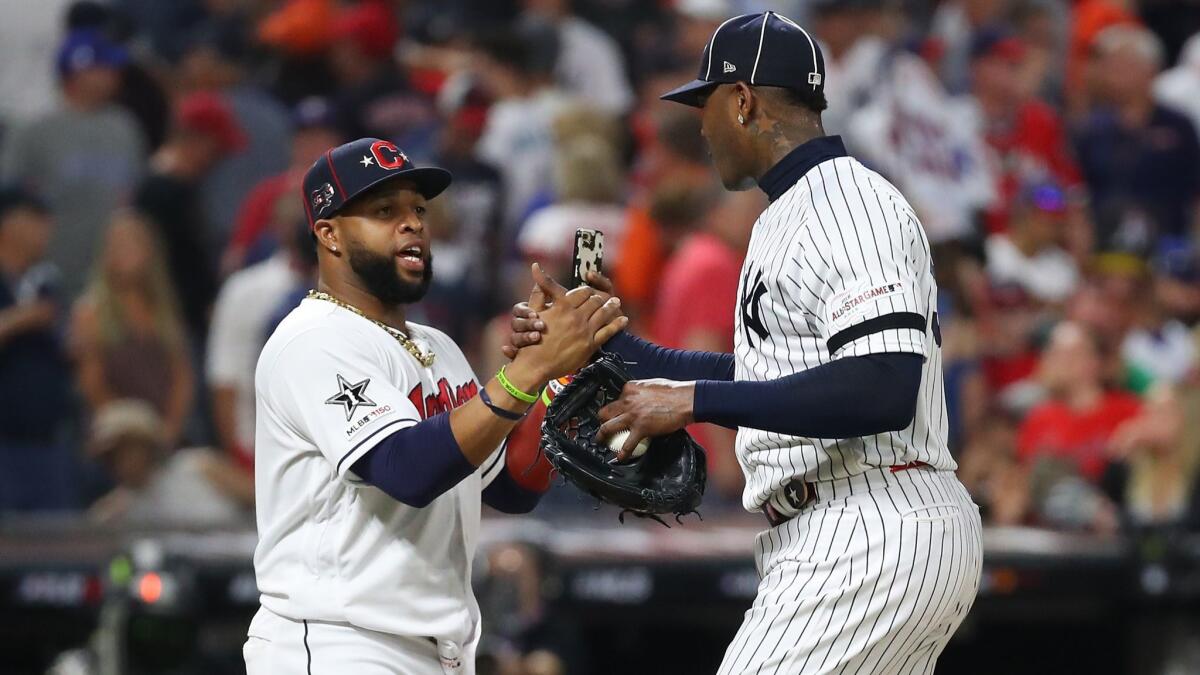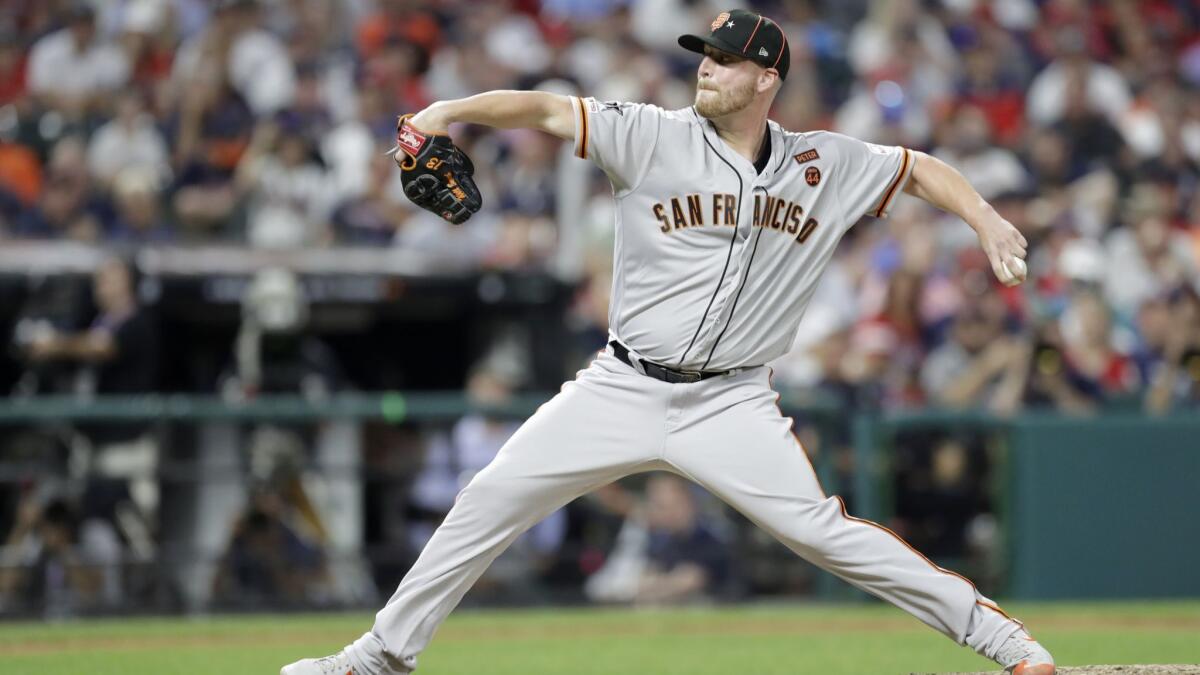American League wins a non-juicy All-Star Game

- Share via
Reporting from CLEVELAND — The object of his disdain rested atop the pitcher’s mound, in the center of the rubber. Houston Astros ace Justin Verlander has denounced its behavior for years. But it remains the primary tool of his trade. So at 8:13 p.m. Eastern time on Tuesday, moments before the beginning of the 90th All-Star Game, Verlander bent at the waist and scooped up the baseball.
“I’m a purist of the game,” Verlander said. “Whether you like homers, or don’t like the way it was, that’s not on me. I prefer, not small ball, but a different brand of baseball.”
Verlander surely enjoyed the proceedings Tuesday, a game the American League won, 4-3. The AL’s seventh straight victory lasted two hours and 48 minutes. Verlander threw a spotless first inning. The most valuable player was Cleveland Indians pitcher Shane Bieber, who struck out the side in a scoreless inning. There were only two home runs — by Texas’ Joey Gallo and Colorado’s Charlie Blackmon — a relative pittance for the modern era.
For one night, at least, the baseball did not look juiced. The baseball — not the sport, but the actual sphere — was the primary subject of discussion during lengthy interviews conducted by Major League Baseball commissioner Rob Manfred and players union chief Tony Clark. With home run rates escalating and the frustration of pitchers rising, Clark stopped short of accusing MLB of deliberately manipulating the baseball, as many of the players have. He did not downplay concern about the subject.
“I believe the ball has changed,” Clark said during a luncheon address with the Baseball Writers Assn. of America. “And I don’t know why.”
Manfred scoffed at the suggestion, raised directly by Verlander and other pitchers, that MLB has conspired to change the baseballs.
“Look, [Major League Baseball] has done nothing, given no direction for an alteration in the baseball,” Manfred said.
He added, “The biggest flaw in that logic is that baseball somehow wants more home runs. If you sat in an owners meeting, and listened to people talk about how our game is being played, that is not the sentiment among the owners, for whom I work. There is no desire on the part of ownership to increase the number of home runs in the game. To the contrary, there is concern about how many we have.”
If that is what the owners actually worry about — and Manfred has suggested in the past that polls show fans actually adore home runs — then their fears are being realized. The sport entered the break with an average of 2.74 home runs per game, well ahead of the previous record of 2.52 set in 2017, the first season when players began to opine about the freakish flights of the baseball.
The record for homers in a season is 6,105, which also was set in 2017. The hitters in 2019 are on pace for more than 6,600 homers. In addition, the strikeout rate has risen for the 12th consecutive season.
“The game has changed,” Clark said. “The ball is different. The why — we haven’t gotten the why yet. Nobody seems to have presented the why yet. There’s been an acknowledgement is that it’s different, and that difference is, in part, yielding different results on the field.
“And so the question becomes: What are we going to do about it?”

Stoking the fears of the players is MLB last year purchased Rawlings, the company that manufactures the baseballs. Manfred indicated that some variation in the baseballs was inherent, because they were crafted by hand. Otherwise, he insisted the commissioner’s office would be transparent.
“If we make a decision to change the baseball,” Manfred said, “you’re going to know about it before we change the baseball.”
Dozens of pitchers believe the baseball is already different. Players have noted smaller seams. Some feel the baseball is harder; Chicago Cubs manager Joe Maddon has joked that they resemble golf balls. The changes have made the baseball more aerodynamic, the players believe.
“Players just want answers,” Washington Nationals ace Max Scherzer said. “Players want to know where this is going to end up. More importantly — if the players don’t know where, then the fans don’t know where.”
Verlander has been the most outspoken critic of the situation. He described the baseballs as “a joke” to ESPN on Monday. Other pitchers of his caliber, like Scherzer and Dodgers ace Clayton Kershaw, have taken a more fatalistic approach.
Neither pitcher would accuse Major League Baseball of acting deliberately. But their exasperation was evident.
Sign up for our daily sports newsletter »
“They might be doing it,” said Kershaw, who gave up a run in Tuesday’s second inning and took the loss. “They might not be. I have no idea. I don’t know if I’ll ever know. I don’t know if we’ll ever know. I don’t really care. Because there’s nothing we can do about it. There’s literally nothing we can do about it.
“If they’re lying to us and they’re hiding it, covering it up so well, what are we going to do? And if they’re not, they’re telling the truth, then we look stupid. I don’t know what you do. The great thing is, it’s fair across the board. Both teams are having to deal with it.”
Verlander said he spoke with MLB officials Monday, after he ranted about the baseballs to ESPN. Verlander declined to comment on the nature of the discussion, but indicated he would contribute to an oversight committee if Manfred sought his input. He also insisted that his complaints did not belong to him alone.
“Some of my teammates in here said ‘Thanks for saying something,’” Verlander said. “It is what it is. If they want it to be changed, then it will be changed. If they don’t, then it won’t.”
Twitter: @McCulloughTimes
More to Read
Go beyond the scoreboard
Get the latest on L.A.'s teams in the daily Sports Report newsletter.
You may occasionally receive promotional content from the Los Angeles Times.











